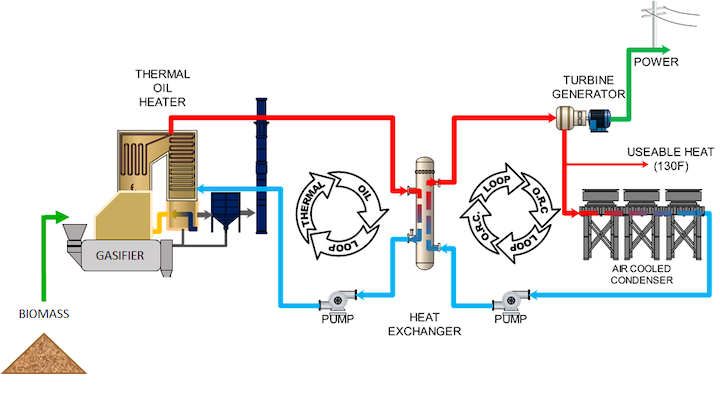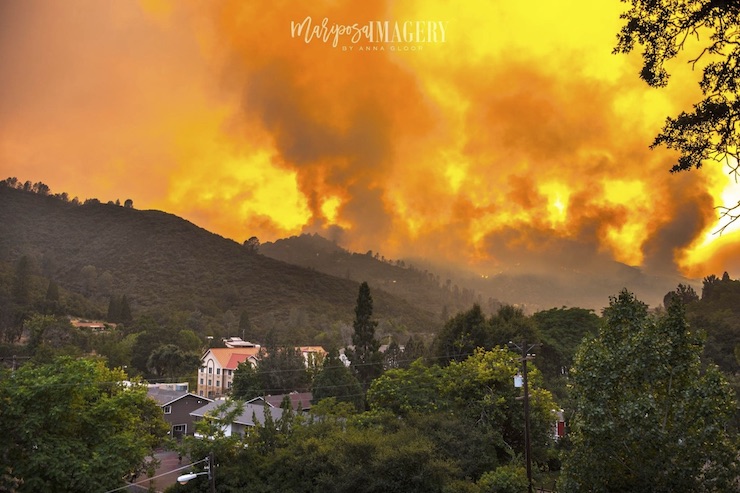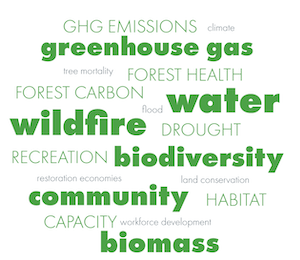The Mariposa Biomass Project
If you are new to this site, start with the FAQ. If you are looking for the latest news, read below. Older news is now in the News Archive.
----------------------------------------------------------------------------------------------------------------------------
 Grading Permit Issued
Grading Permit Issued
In May of this year (2024) the Mariposa County Planning Commission reviewed the efforts that our technology partner, West Biofuels, had made to assure that the project under their direction and with their technology met all the conditions of our Conditional Use Permit (CUP).
After a presentation from the Planning Director and considering community input, the Planning Commission voted 4:1 to certify that West Biofuels had met all relevant conditions in the CUP including air pollution standards, and as a result, Mariposa County issued the Grading Permit for the project. West Biofuels is finalizing plans for grading and will soon receive bids from contractors for this work, which given the winter rains, will likely start in the spring of next year.
Myths and Facts about the Mariposa Biomass Project
In response to a recent Letter to the Editor in the Mariposa Gazette and an attempt on social media to spread false information about our project, we have prepared a Myths and Facts document to address some of these rumors. It can be viewed here.
----------------------------------------------------------------------------------------------------------------------------
New Grants
Mariposa Biomass Project is pleased to announce that it is part of a bioenergy plant cluster that was recently selected to negotiate an award of up to $30M with the Office of Clean Energy Development at the US Department of Energy. We are excited to see how this develops for our project! See the press release from West Biofuels. We were also pleased that our project received $2 million as part of a recent $4M grant that West Biofuels received from Cal Fire.
----------------------------------------------------------------------------------------------------------------------------
Update on Project Status and New Technology Provider
The non-profit Mariposa Biomass Project was formed in 2014 with the goal of establishing a small-scale biomass to electricity facility here in Mariposa County to help cleanly dispose of forest biomass that has been removed from around infrastructure for reasons of public safety, and to convert that biomass to clean, green, renewable energy. We first met with Cortus Energy, a Swedish technology company in 2015, signed a development agreement, and applied for and received a $5 million-dollar Epic grant from the California Energy Commission (CEC) to build a demonstration biomass project in Mariposa County with the goal of an operational plant by March of 2018.
Over the next few years, the project encountered delays due to technology and other commercial issues. In late 2022, the project team made the difficult decision to change technology partners in order to meet the funding requirements and timeline for the project. West Biofuels stepped up and committed to a timeframe agreeable to the project partners, to developing the private funding needed to complete the project, and, importantly, to configure the plant for the Mariposa Biomass Project in a way that is consistent with the Conditional Use Permit developed in cooperation with Mariposa County.
That is where our project stands today and we are in the final stages of working with West Biofuels, the CEC, and Mariposa County to formalize this new partnership which include the formation of Mariposa Bioenergy, LLC.

The West Biofuels technology is much simpler than other technologies we considered and therefore likely more robust with a wide range of forest biomass fuels. It is based on the use of thermal oil heater to transfer heat from the gasifier to a closed-loop Organic Rankine Cycle turbine that runs a generator to produce electricity. One advantage of West Biofuels technology is that the process itself uses no water thus removing the concern expressed by the community.
----------------------------------------------------------------------------------------------------------------------------
Sierra Nevada Conservancy on Key Issues For the Sierra

Wildfires and managing the forests in the Sierra are not trivial problems with simple solutions, e.g. clear cutting is not the answer. We need a range of management options to restore forest resilience so that our watersheds can provide wildlife habitat, the water we all need, and our forested areas can provide the recreational and economic activities so vital to our Sierra communities.
 The Sierra Nevada Conservancy, SNC, is a State agency established through bi-partisan legislation to initiate, encourage, and support efforts that improve the environmental, economic, and social well-being of the Sierra Nevada Region, its communities, and the citizens of California. Recently SNC published a short document outlining the Key Issues facing the Sierra including fire, water, greenhouse gas reduction, biodiversity and community resilience.
The Sierra Nevada Conservancy, SNC, is a State agency established through bi-partisan legislation to initiate, encourage, and support efforts that improve the environmental, economic, and social well-being of the Sierra Nevada Region, its communities, and the citizens of California. Recently SNC published a short document outlining the Key Issues facing the Sierra including fire, water, greenhouse gas reduction, biodiversity and community resilience.
The document recognizes the role biomass utilization and small-scale biomass-to-energy plants can play in economy of Sierra communities while reducing the greenhouse gas and air pollution compared to the open pile burning normally associated with forest management practices.
The Mariposa Biomass project appreciates the SNC’s support of our project since day one, and their continuing support ever since with training on grant writing and good advice on many issues.
----------------------------------------------------------------------------------------------------------------------------
Article About Wildfire Risk in California and Biomass Plants
A recent article in grist magazine examines the role that small-scale biomass plants might play in reducing wildfire risk and air pollution in California. The author, Nathanael Johnson, obviously spent a fair amount of time talking to both proponents and opponents of such projects including many major environmental organizations. Our project was interviewed and quoted in the article, which to us seemed balanced with arguments for both sides presented.
----------------------------------------------------------------------------------------------------------------------------
Do biomass power plants use a lot of water? We recently heard an objection to our project based on the assumption that a biomass power plant would necessarily use a lot of water. The quick answer is that many power plants, including some biomass plants, do use a lot of water, but our plant will not as we are using a very different technology for generating the electricity - an Organic Rankine Cycle turbine rather than a steam turbine. In fact, the West Biofuels process does not use any water in the conversion of biomass to electricity. Of course, like any business, some water will be needed for domestic water use, dust control and stored for fire suppression.
----------------------------------------------------------------------------------------------------------------------------
Is burning biomass contributing to global warming? Should burning wood or other biomass be considered clean, green renewable energy?
There has been a fair number of news articles lately, such as this one on Climate Central, about the wood pellet industry and the fact that we are harvesting trees in the U.S. to make wood pellets for use as fuel in power plants in Europe and Asia. In fact the majority of “renewable energy” in Europe comes from burning wood, and according to Climate Central article, the power plants burning the wood are getting tax credits aimed at mitigating climate change, and yet the article alleges that those plants making climate change worse! The article claims that wood-based energy exploits a loophole that allows wood to be considered renewable to the detriment of our planet?
So why are we considering a biomass plant in Mariposa? Should we be shutting down all the biomass plants in the Central Valley that burn agricultural waste, e.g. orchard trimming, almond shells and peach pits because burning biomass is contributing to global warming? The answers to these questions are not simple and include analysis of the fuel sources and the alternatives for disposal of various biomass waste streams. One can use other technologies that actually help reverse climate change rather than exacerbating it. The devil is in the details. So what is the truth and how does the Mariposa Biomass Project fit into all this? Click here to find out.
----------------------------------------------------------------------------------------------------------------------------
Questions or Comments:
For questions about the organization, contact the Mariposa Biomass Project at admin@mariposabiomassproject.org
For comments on the website: Steve Smallcombe at stevesmallcombe@mariposabiomassproject.org

